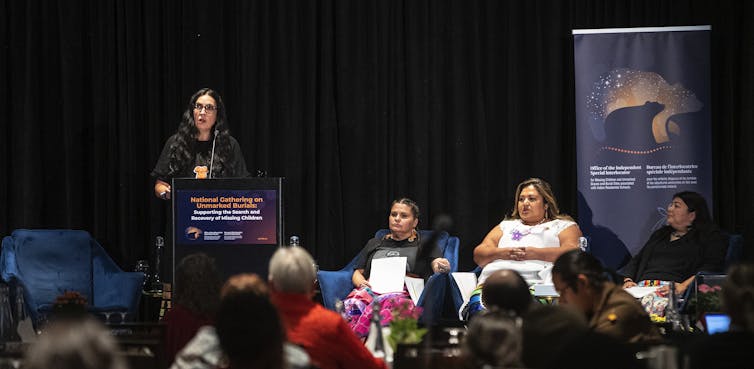Recently a politician from a village in Prince Edward Island displayed an offensive sign on his property in which he proclaimed there is a “mass grave hoax” regarding the former Indian Residential Schools in Canada. Although many have called for him to resign, he is just one of many people who subscribe to this false theory.
A hoax is an act intended to trick people into believing something that isn’t true. Commentary that a “hoax” exists began circulating in 2021 around the time of public announcements from First Nations across the country that — through the use of ground penetrating radar and other means — the remains of Indigenous children are suspected to be in unmarked graves at or near some former residential schools.
Commentators circulating allegations of a “hoax” contend journalists have misrepresented news of the potential unmarked graves, circulating sensational, attention-grabbing headlines and using the term “mass grave” to do so. They also contend some First Nations, activists or politicians used this language for political gain — to shock and guilt Canadians into caring about Indigenous Peoples and reconciliation.
Like the councillor in P.E.I., many people — in Canada and internationally, fuelled partly by misinformation from the far-right — are accepting and promoting the “mass grave hoax” narrative and casting doubt on the searches for missing children and unmarked burials being undertaken by First Nations across Canada.

It appears that some journalists and commentators misunderstood a large number of potential or likely unmarked graves for mass graves in late May/June 2021. By September, denialists were misrepresenting the extent of media errors to push the conspiratorial “mass grave hoax” narrative online.
Our research shows that the “mass grave hoax” narrative hinges on a misrepresentation of how Canadian journalists reported on the identification of potential unmarked graves at former residential school sites in 2021. And we hope our report sparks a national conversation about how important language is when covering this issue.
Media needs to be precise with language and also acknowledge its errors (and avoid future ones), or clarify details in a way that feeds truth, empathy and more accurate reporting — not denialism, hate and conspiracy.






















No comments:
Post a Comment
Please: Share your reaction, your thoughts, and your opinions. Be passionate, be unapologetic. Offensive remarks will not be published. We are getting more and more spam. Comments will be monitored.
Use the comment form at the bottom of this website which is private and sent direct to Trace.